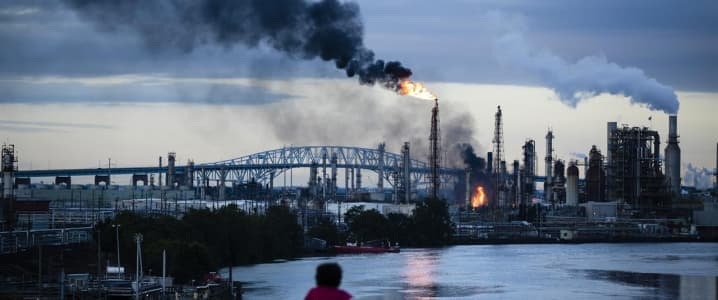South Philadelphia was rocked by a massive refinery explosion on Friday, with fire and smoke billowing into the air.
The images were horrific.
PHILADELPHIA REFINERY FIRE: Video of the explosion at a Southwest Philadelphia refinery captured by a 6abc Action News traffic camera. https://t.co/Gy3VRZZyyF pic.twitter.com/mbuyg6Lcw0
— Action News on 6abc (@6abc) June 21, 2019
The explosion was enormous, rocking nearby neighborhoods. Area residents were told to stay inside shortly after the explosion. The city later said that the air pollution from the refinery posed little cause for concern, although some experts questioned that assessment. Of particular concern was that the explosions hit the alkylation unit, which uses hydrofluoric acid (HF), a chemical that can be deadly.
The facility, owned by Philadelphia Energy Solutions (PES), has had fires in the past. One occurred as recently as earlier this month. It is over a century old, with refining operations dating back to the 19th century, and it is currently the largest source of toxic pollution in Philadelphia County.
The disaster could have broader implications for regional energy markets. Wholesale gasoline prices spiked by more than 3 percent on Friday in New York. The PES refinery can process 335,000 barrels of oil per day, or 14 million gallons, and it is one of the largest suppliers of gasoline on the eastern seaboard. The facility also produces low-sulfur diesel fuel, jet fuel, kerosene, butane, propane and home heating oil. The outage comes just as peak summer driving season is beginning, a time of year in which gasoline prices tend to rise. This year, however, motorists are set to benefit from a collapse in crude oil. Related: China Launches World’s First Smart Oil Tanker
Prices for gasoline in other markets – the Gulf Coast, the Chicago area – appeared mostly unaffected initially. But if the outage in Philadelphia lingers, Pennsylvania would likely pull in gasoline from elsewhere, including from the Midwest, Gulf Coast and from Europe. It could also scramble crude oil flows. According to Argus Media, the refinery processes light oil from West Africa and the North Atlantic, and the facility imported roughly 150,000 bpd in the first quarter. Argus noted that two Suezmax oil tankers were en route from West Africa to the refinery when the explosion occurred.
“This will mean a significant loss of gasoline production,” said Andy Lipow, president of Lipow Oil Associates, according to Bloomberg. “There’s certainly going to be price increases from an initial shortfall.”
The effects could linger. Three separate explosions “impacted” a unit that produces alkylate, which enhances the octane in gasoline. According to Reuters, the alkylation unit was “completely destroyed,” which could mean that a portion of the complex could remain shut for “an extended period of time,” perhaps cutting off 200,000 bpd of capacity. Sources told Reuters it could take “several years” for the company to rebuild the unit.
Others say the outage might not pose a significant disruption to regional energy markets. “Our view would be, there's enough supply to meet the demand if you were to lose production,” John Coleman of Wood Mackenzie told E&E News, arguing that there is other refining capacity on the East Coast. Related: The Irony of California’s Oil Dependence
Philadelphia Energy Solutions only emerged from bankruptcy last year, and has had battered finances for quite some time. PES made headlines last year when it entered bankruptcy, which it blamed on ethanol blending requirements. The financial distress put political pressure on the renewable fuels standard and the obligations for refiners, ultimately leading to a war between the ethanol and oil refining industries.
The EPA, then under administrator Scott Pruitt, seemed to side more with refiners, at least initially, issuing a higher level of waivers to refiners than in the past, allowing them to shed some of their ethanol requirements. The Trump administration has since tried to repair its relationship with corn and ethanol producers, moving to allow the year-round sale of E15, a higher concentration of ethanol.
The explosion at the PES refinery will only deepen the company’s financial woes. It is also under increasing scrutiny from the city and nearby communities who are angry at air pollution from the facility. No doubt the outrage will rise to new levels after the recent explosions, likely putting pressure on politicians to take action. “We really think the refinery should have to stop operating,” Jo CordonHill, an organizer with the neighborhood environmental group Philly Thrive, told E&E News. A key air permit is set to expire this summer, which leaves PES vulnerable to public pressure.
By Nick Cunningham of Oilprice.com
More Top Reads From Oilprice.com:
- The West Just Made A Big Mistake In Middle East
- The Oil Company Investors Fear Most
- OPEC Aims For $60-$70 Oil


















